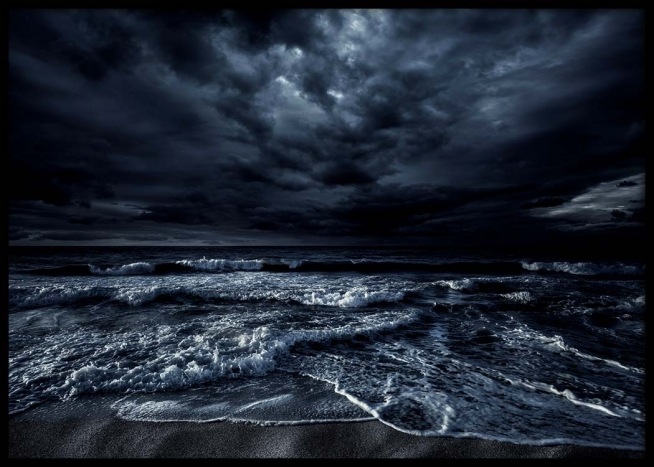Throne of Salt wrote about how D&D gets monsters wrong here: https://throneofsalt.blogspot.com/2020/08/d-doesnt-understand-what-monsters-are.html, and how they could be done better.
Monsters in this style are a symptom that something has gone wrong in the natural order of the world, either created by that something or shifted from their normal behaviour into conflict with humanity by it. Something appears which does not belong, something occurs that violates proper action or relations.
Here's five monsters done in that style:
The Cliff-Clinger of Peace-on-the-Shore
There's a
town, a lively, prosperous town, on an otherwise wreck-wracked stretch
of coast. It's a haven for passing ships, half natural harbour and half
painstakingly carved from the cliffs over generations. This town is
called Peace-on-the-Shore. It is afflicted by two plagues:
The
first plague is organized crime. The trade passing through
Peace-on-the-Shore is lucrative, but the town produces little of its own
to export. Its economy is based around catering to passing sailors and
merchants, their lodgings and their vices. The services and substances unpalatable to the town's burghers are a pie sliced between criminal families that run the gamut from old and publicly respected bloodlines to barely above the gutter rats.
The second plague is a pernicious haunting. The cliffs of Peace-on-the-Shore are tall and steep, its stone-hewn steps often slick with rain. If someone is said to have tripped or fallen to a snapped neck or drowning then few would be willing to question it. It's because of this that criminals often dispose of problematic people with a well-timed shove.
The ghosts of those assassinated and denied justice over the years have mingled together beneath the waves, becoming a revenant stretched like taffy and stinking like a stagnant sea. The thing is indiscriminate (its eyes shut tight beneath bloated lids), striking out when the storms come at lonesome, lightless folk.
Maybe it'll stop when the killers running amok are faced with their sins. Maybe you can destroy it faster than the wrathful dead stack up and coalesce into new ones. Maybe it's too far gone, rotted into the roots of the town itself, and the only end will come when the revenant drags Peace-on-the-Shore down to the depths and into hell.
The Brownie of the Dascala Dyeworks
When humans felled the forests and seeded their fields, there were fairies who adapted.
When the fields were enclosed and entitled to fewer and fewer people, there were fairies who adapted.
When former farmers left their fields behind for the cities and their burgeoning industries, there were fairies who adapted.
Some time ago there was a brownie who lived in a hearth in a farmhouse. It swept the floors, beat away vermin, and generally fulfilled the whims of the house's master. Then the farm was lost, the house torn down for fencing, and the family who once lived there began to work for wages in the dyeworks in nearby Dascala. Bereft of purpose, the brownie too entered the dyeworks, but the master of the farmhouse was just another servant there. The brownie gained a new home, and a new master.
As before, it fulfilled the whims of its home's master. The brownie heated the vats, dried the textiles, invisibly beat slacking workers with a switch, balanced the books, and so on. When its former master tried to lead a strike for higher pay he disappeared, and the next day bolts of cloth with a luscious crimson colour were found in a storeroom. The cloth became an overnight fashion craze, and the dyeworks' owner began treating its workers worse in the hope that one of them would act out again.
Brownies are creatures of fey courtesy. Once they feel they've been disrespected (and a lot of odd things can make them feel disrespected) their anger is unquenchable. The dyeworks' owner is unlikely to ever anger his brownie on his own. He is a meticulous and incurious businessman.
Ginblissums
It's said that before the first grain of rice was planted, the demon Mephistopheles gave humanity three great gifts: iron, alcohol, and dogs, knowing that each would be abused. For this it earned the title "Manfriend".
Alcohol was perhaps the first to be abused. In any case it was the easiest. You simply have to drink too much of it, and bad decisions tend to follow. Where enough peoples' lives are destroyed by the devil's drink a ginblissum is born. It is something like a ghost, not of what once was but what could have been.
Normally they're merely annoying poltergeists, content to make messes, fling stuff around, and vomit stinking ectoplasm in unusual places. However a ginblissum is sensitive to emotions, particularly negative and repressed emotions. They'll torment the guilty and depressed, enact the rampages of the hateful, ruin what the jealous covet, and so on. One so agitated can easily become lethal.
If you're sober, you won't be able to see or touch a ginblissum, and the same goes for it (though it can still sense you through your emotions, and throw shit at you). The drunker you are the more material it becomes for you. They tend to look like bizarre and colourful hybrid animals, with comically large noses and throbbing heads.
Ginblissums tend to spawn wherever people are hopeless, lonely, and trying to forget.
The Black-Veiled Bride
Love is not always good, or good for us. Love is blind.
There once was a woman who was very much in love with the man she was to marry. Because she was so in love she ignored the signs that the man was cruel, that he surrounded himself with cruel people, that he had found another woman younger and wealthier than she was.
That man was so cruel that he not only left the woman on her wedding day, he had his friends cut her face so badly that no other man would ever want her. After that day she was never seen again. After that week neither were the man and his friends.
There's a bit of folklore in the city where they lived: If your heart's broken, and you go looking for it, you'll come across a ruddy red door where one shouldn't be. Pour your heartbreak out before that door, give it the name of the one responsible, and they'll be visited by a woman in a black veil. She'll show them her face, and the sight will scare them into a seizure, a stroke, or an awful death.
Many in the city die young, and many that don't are left brutalized. It's not something they like to talk about, whether it was something inflicted on them or that they wished on another. Those that can afford it keep their children house outside the city, arrange their marriages to avoid the tribulations of romance. Those that can't suffer generation after generation from the injuries of youthful and impulsive hearts.
The Devil-Wind
The middle air is the domain of the noble winds, 'noble' referring to their station rather than their character. The gravest of sins among these noble winds can only be punished in the gravest fashion: being bound to the earth.
What sin the devil-wind committed up above, or what is was called before are unknown, and likely incomprehensible by mortal minds. What myth makes clear is that there was an agreement made with the people who inhabited the region where the devil-wind was bound, which gave them the means and responsibility to maintain its binding.
These people were nomads, cattle-herders who painted sigils on their cows, sung spell-songs, and worked geomantic rites with the patterns of their migration.
Their neighbours farmed wheat, millet, and yams. They constructed vast irrigation networks to transform the plains into arable land. As their territory expanded, the nomads' shrank. Some of the cattle-herders took to raiding, razing fields, making terrifying examples of those they caught. Some traded, settled, assimilated. Some did both, depending on the day.
In the end the agriculturalists' state won out. They could organize violence to a greater degree and offer commodities the nomads' elites couldn't get elsewhere. The nomads' lands became a rump at the edge of a swelling empire.
Then entire villages began to die, suffocating in the night.
There were too few left who still walked the old paths, too few who knew the spell-songs, let alone the language they were sung in. The devil-wind's binding was weakening, and so it groped past the bars of its cage.
The empire is confident that it can handle the problem, and woefully unprepared to actually do so. Its might is suited to breaking bones and rending flesh, not fighting an invisible and intangible enemy from a place close to the gods. Many innocents will die before it returns to the sky.


